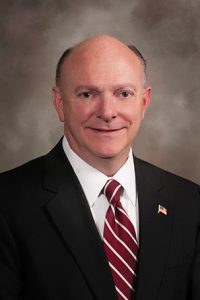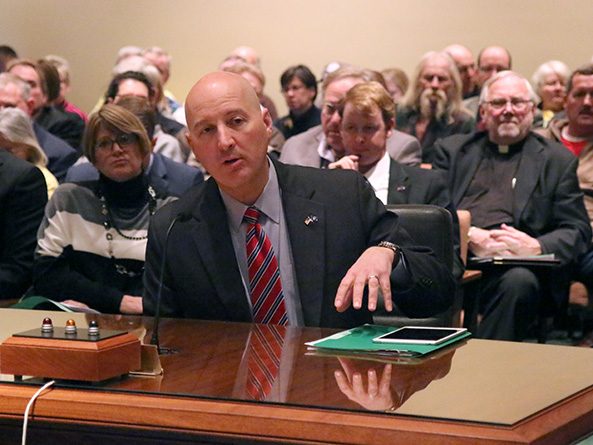Proposed income tax cuts tied to economic growth
A bill heard by the Revenue Committee Feb. 8 would incrementally reduce the state’s top income tax rate over the next decade if economic growth meets a benchmark rate.
Introduced by Sen. Jim Smith of Papillion at the request of Gov. Pete Ricketts, LB337 would reduce the highest individual income tax rate by roughly 0.1 percent per year from 2020 to 2027, provided that the expected rate of revenue growth from year to year exceeds 3.5 percent.
The state’s top income tax rate would drop from 6.84 percent in 2020 to 5.99 percent in 2027, for a total reduction of 0.85 percent. The state Department of Revenue estimates that the bill would reduce state tax revenue by approximately $288 million in fiscal year 2027-28.
Smith said the bill would provide tax relief for the state’s small business owners, most of whom pay taxes as individuals, at a higher rate than corporate taxpayers. Small business owners could use that extra money to expand, he said.
“Some individuals will see smaller savings than others,” Smith said, “but collectively more than $1 billion will be introduced into the economy once LB337 is fully implemented.”
Each year beginning in November 2019, the Legislature’s Tax Rate Review Committee would use data from the Nebraska Economic Forecasting Advisory Board to determine whether the income tax rate would be cut for the next fiscal year. If the board determines that the projected rate of tax revenue growth is less than 3.5 percent, the rate cut would be deferred.
From 2020 to 2026, any deferral would remain in effect until the expected rate of growth exceeds 4.2 percent.
Ricketts said the bill would help Nebraska compete with neighboring states when attracting new businesses. Iowa is the only neighboring state with a higher income tax rate, he said. Kansas, Colorado and Missouri have lower rates, and Wyoming and South Dakota have no income tax. Ricketts called the gradual reduction a prudent and measured approach to reducing Nebraska’s income tax rate.
“We didn’t get to be a high-tax state overnight,” he said, “and we’re not going to get back down out of being a high-tax state overnight.”
Tony Fulton, state tax commissioner, said that although the proposal might result in only modest tax relief in any single year, the incremental reductions would make a big difference over time. Nebraska businesses and those outside the state would consider that fact when they are planning to expand or relocate, he said.
“We should strive to make our income tax rates competitive with other states, we should do so incrementally and we should do so as available revenue allows,” Fulton said.
Jeffrey M. Scherer, testifying on behalf of the Nebraska Chamber of Commerce and Industry, spoke in support of the bill, saying it would cut taxes on the 90 percent of Nebraska businesses that pay income taxes at the individual rate. He said the state’s income tax rate makes it difficult for businesses to attract skilled workers.
“If we really want to grow our economy,” he said, “we must provide income tax relief.”
Renee Fry, executive director of the OpenSky Policy Institute, opposed the bill, saying that similar automatic cuts adopted by Oklahoma resulted in a budget crisis when state tax revenue dropped unexpectedly. She said 33 percent of the bill’s tax cuts would go to the wealthiest 1 percent of Nebraskans and would do little to help most small businesses.
Once the bill is fully implemented, Fry said, an earner in the state’s top 1 percent would receive a $5,800 annual tax cut, while middle income earners would receive only $39 and people with low incomes would receive nothing.
“The revenue losses created by LB337 would, however, impede Nebraska’s ability to invest in real economy builders like schools, public safety and infrastructure,” she said.
Kenneth Kriz, professor of public finance at Wichita State University, testified in a neutral capacity. He said his research, which includes analysis of data from all 50 states over 40 years, has found no strong correlation between tax cuts and economic growth: for every 1 percent cut in taxes, a state’s economy grew by only 0.2 percent. Because the tax cuts do not pay for themselves, Kriz said, states then must cut spending.
“On the whole,” he said, “the benefits do not outweigh the costs of this.”
The committee took no immediate action on the bill.


